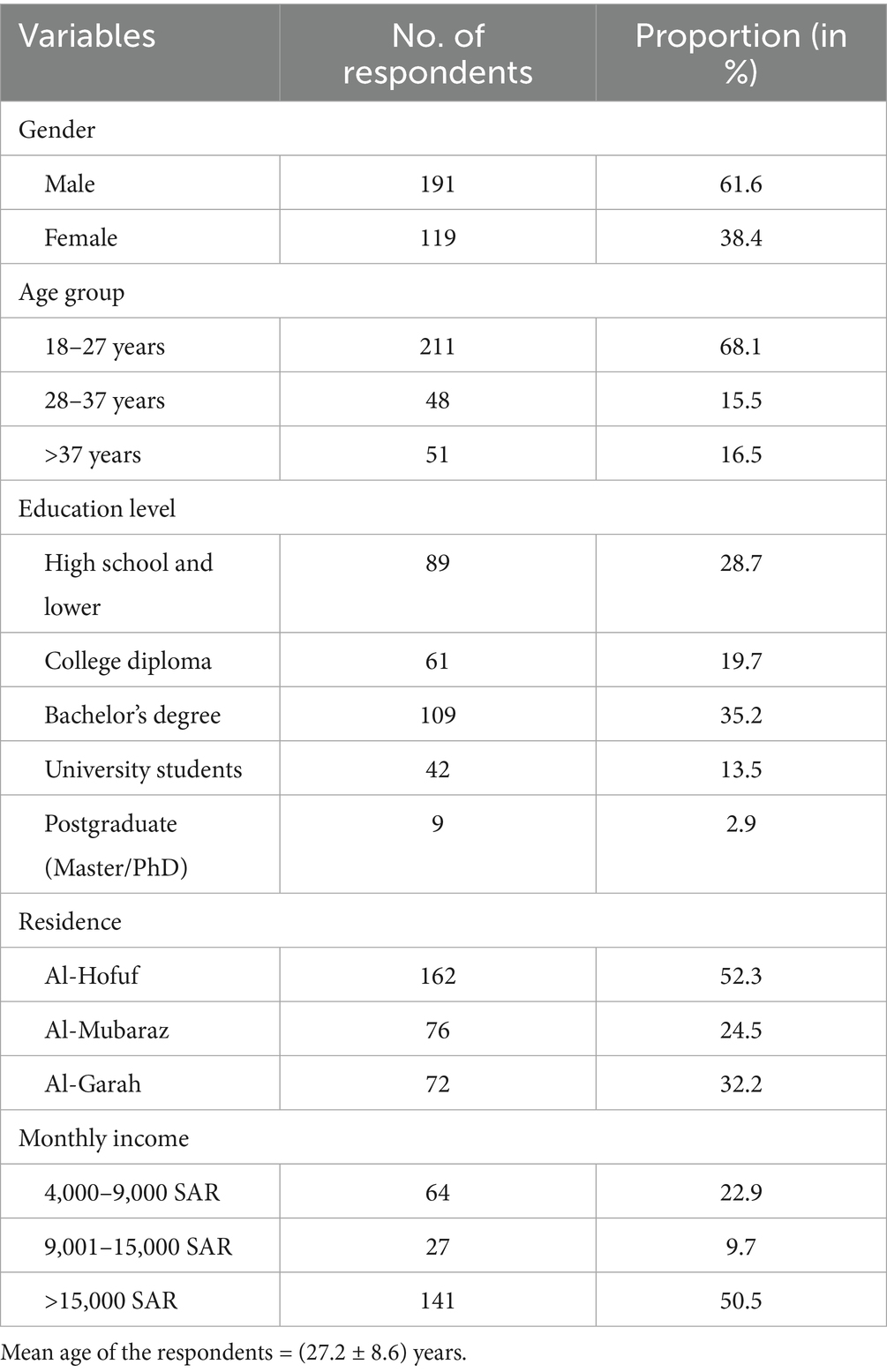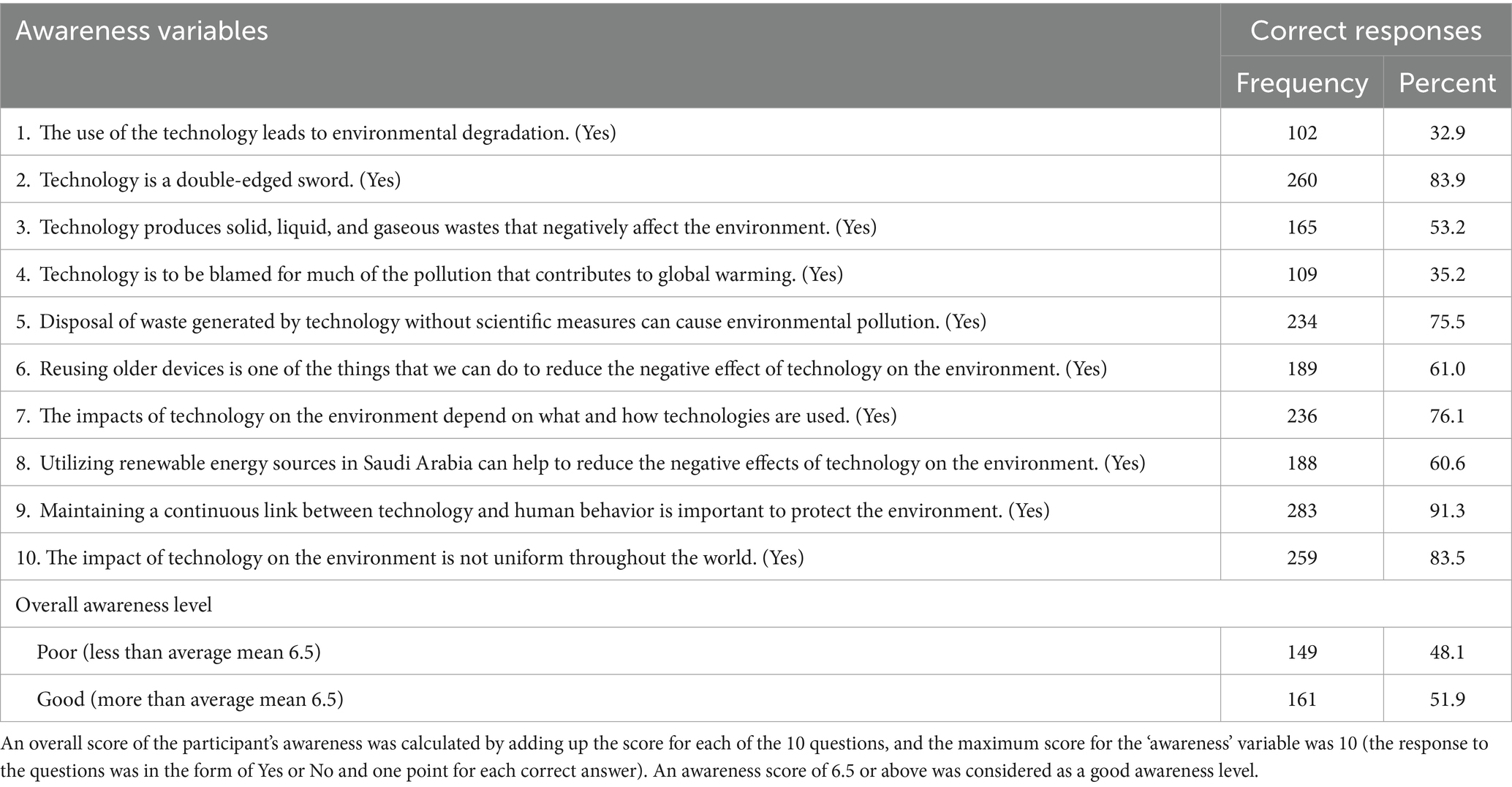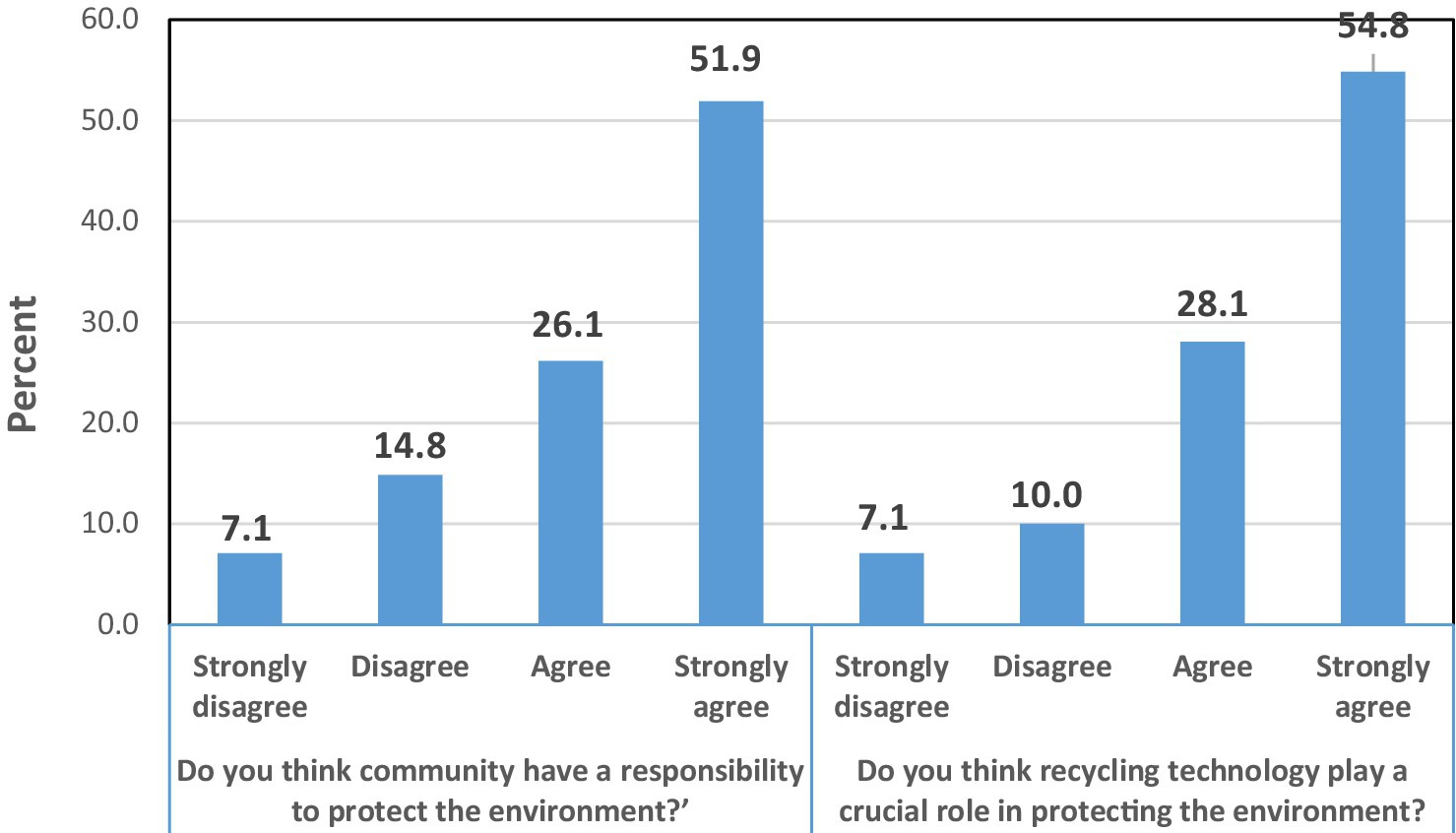- 1Department of Public Health, College of Applied Medical Sciences, King Faisal University, Al Ahsa, Saudi Arabia
- 2Department of Respiratory Care, College of Applied Medical Sciences, King Faisal University, Al Ahsa, Saudi Arabia
- 3Department of Nursing, College of Applied Medical Sciences, King Faisal University, Al Ahsa, Saudi Arabia
Introduction: Technology is a major and indispensable part of everyone’s life, but the negative utilization of advanced technology has caused numerous global environmental problems, such as declining biodiversity, climate change, ozone depletion, overpopulation, and hazardous waste. The current study primarily aims to assess environmental awareness perceptions and perceived behaviors held by the community toward the Impacts of Advanced Technology on the Environment.
Methods: An analytical cross-sectional study design was conducted among 310 residents of the three administrative areas of Al-Ahsa (Al-Hofuf, Al-Mubaraz, and Al-Gourah) in eastern Saudi Arabia from January to February 2024 with a response rate of 80.7%. A researcher-developed questionnaire consisting of four sections was utilized with a Cronbach’s alpha test result of (0.81). The data was analyzed using SPSS version 24, which included descriptive statistics, chi-square, and multivariate logistic regression. Crude and adjusted odds ratios were reported with corresponding 95% confidence interval estimates; statistical significance was set at an alpha less than 0.05.
Results: More than half of the study participants exhibited a relatively good awareness level and a positive perception, especially males, younger respondents, those with bachelor’s degrees, and urban residents. Multivariate analysis showed that younger respondents with high education levels adjusted with good levels of awareness were more likely to develop positive perceptions toward the impacts of advanced technology on the environment. In addition, we observed that the participants with positive perceptions and good awareness were more likely to donate their equipment when not in use and use alternatives to technology. Awareness and positive perceptions motivate them to practice responsible behaviors toward the environment.
Conclusion: There is a need for education and promotion programs to be implemented in the community to promote concern for the environment, encourage favorable perceptions to shape their practices and prepare them to continuously practice environmentally friendly activities.
1 Introduction
Technology is a major and indispensable part of everyone’s life at home, school, and work; there is approximately no place around the globe not using any technological devices due to rapid technological innovations like the production of more machines, weapons, and automobiles (1). The use of technology leads to environmental pollution due to industrialization, mismanagement, and lack of control measures which has greatly shaped and impacted society, the economy, and the environment (2, 3). Technologies are implicated in many contemporary harms, including waste production, depletion of resources and air, water, heat, and noise pollution (4). They have become principal threats to the ecosystem, public health, economic growth, and sustainable development (5, 6).
Numerous studies reported that the negative utilization of advanced technology caused numerous global environmental problems, such as declining biodiversity, climate change, ozone depletion, overpopulation, and hazardous wastes, thereby causing problems of air and water pollution and toxic waste disposal common in all industrialized countries (3, 7). Millions in developing countries lack access to sanitation services and safe drinking water, while dust and suspended materials contribute to hundreds of thousands of deaths yearly. Moreover, serious damage from pollution and overuse of renewable sources of energy challenges world fisheries, agriculture, and forests, with significant present and possible adverse effects on the physical environment (8).
The 21st century brought about significant environmental changes leading to global environmental problems, technological developments, and industrialization initiatives that revolutionized all aspects of human life (9). For example, in the United States, emissions of primary pollutants into the atmosphere are due to transportation (46%), fuel consumption in stationary sources (29%), industrial processes (16%), solid waste disposal (2%), and others (7%) (10). In the UK, the emissions of the basket of seven greenhouse gases covered by the Kyoto Protocol were estimated to be 451.5 million tons. Carbon dioxide (CO2) is the most dominant greenhouse gas (GHG), accounting for 81% of total UK greenhouse gas emissions (11). The consensus in the early 1990s was that the human-induced greenhouse effect had already warmed the earth by about 0.5 °C and a further warming of about 2.0 °C by 2030 (12). In this regard, Cassia et al. (13) identified in an experimental study that the short-term consequences of GHG increase in plants are mainly associated with the rise in atmospheric CO2. It likewise highlighted that in the absence of the greenhouse effect, the average temperature on the earth’s surface is estimated at around −19 °C instead of the current average of 14 °C (13). A survey of 33 countries showed that environmental issues did not rank first in any surveyed nations indicating that the world is soon entering an age of increased environmental apathy (14). Furthermore, technology contributes toward the depletion of resources by increasing industrial activity requiring raw materials from natural resources such as coal, timber, wild animals, forest cover, water, and soil fertility, and its organism’s composition is a likely event (15). On the other hand, technology plays a critical role as an instrument for observing and monitoring the environment on global and local scales and mitigating the effects of pollutants as well, as technology has been seen as the solution that arises from specifically driven research into practical problems (16). In addition, other studies suggested that the right employment of technology could save the environment.
Considering the previous discussions, humanity faces many environmental problems and challenges that adversely affect its health and well-being because it’s closely linked to the integrity of local, regional, and global ecosystems (17, 18). These problems cannot be managed only by cause-and-effect relationships, as they involve myriad factors and vary over time and space (16). Because of the interdependencies between humans and the environment, most environmental challenges require a fundamental increasing level of knowledge and changes in perceptions and behaviors among the population.
According to our knowledge, numerous studies have been conducted worldwide on technology and its impacts on the environment. While in Saudi Arabia, no studies, especially in Al-Ahsa, focused on the impacts of advanced technology on the environment and the role of community awareness in reducing the adverse impacts of technology on the environment and even human health. Therefore, we examined the status of environmental awareness and perceptions held by Al Ahsa residents toward the impacts of advanced technology on the environment. The study’s outcomes may support the delivery of information to authorities about public awareness and perceptions of the causes of the adverse impacts of technology on the environment. Thus, we hypothesized that the participants from different areas and with various demographic characteristics in the study area were asked about various environmental issues, and their awareness and perceived responses helped inform the planning and setting strategies for reducing adverse impacts of technology and making decisions regarding a sustainable environment.
2 Materials and methods
2.1 Study design and setting
This scholarly work employed an analytical cross-sectional study design among people living in the three administrative areas of Al-Ahsa (Al-Hofuf, Al-Mubaraz, and Al-Gourah) in the Eastern Region of Saudi Arabia. Based on voluntary and informed consent respondents filled out (written) the questionnaires during the period of Jan. 01, 2024 to Feb. 28, 2024. Data were fully anonymized to ensure that individual users could not be identified. The Ethical Clearance was obtained from the Deanship of Scientific Research at King Faisal University with reference number KFU-REC-2023-DEC-ETHICS1704.
2.2 Study population and sampling
The estimated population of the residents aged 18 years and above is (853072) individuals (Central Authority for Statistics, year 2022); 42.0% of them are residing in Al Hofuf, 38.0% in Al-Mubaraz, and 20%, in Al-Gourah. The minimum sample size of 381 was calculated using Epi Info® version 7 based on the following parameters; The estimated population of those aged 18 years and above is (853072) (19) (Al-Ahsa, Saudi Arabia – Population and Demographics https://www.city-facts.com/al-ahsa/population), confidence interval (CI) of 95%, anticipated frequency of 50% and maximum tolerable error of 5%. A total of 384 sample size was computed with a proportional allocation of the calculated sample size as follows: (160) for Al-Hofuf, (145) for Al-Mubaraz, and (76) for Al-Gourah. The sampling units for this study were drawn using a two-stage probability sampling procedure.
2.3 Instruments
The instrument used in this study was a researcher-developed questionnaire consisting of four sections. Section 1, comprised questions about the participants’ demographic characteristics, such as gender, age, education level, residence, and monthly income. Section 2, consisted of ten questions ascertaining the participants’ awareness of the impacts of advanced technology on the environment. Section 3, included two perceptional statements about the impacts of advanced technology on the environment; Section 4, consisted of two questions regarding respondents’ perceived behavior to reduce the negative impacts of advanced technology on the environment.
To test the reliability and validity of the questionnaire and to estimate the time required to answer all questions, the questionnaire was tested among (27) respondents who were selected randomly from study population. Pilot testing was also conducted to evaluate language, structure, understanding of the questions and duration. The reliability and validity of the tool was tested using Cronbach’s alpha test result of (0.81).
2.4 Variables
An overall score for the participant’s awareness was 10, calculated by adding the score for each question. The response to the questions was in the form of “Yes or No” and was given one point for each correct answer. The categorization of the participants was based on the mean score in each section and was dichotomized: participants who obtained a score equal to or higher than 6.5 points in the awareness section were considered as having a “good awareness level, while those with less than 6.5 were classified as having “poor awareness level.”
The perception questions’ responses were a Likert-type scale with four dimensions, “strongly agree, agree, disagree, and strongly disagree,” with a maximum score of (8).
Four points were allotted for strongly agree and one point, for strongly disagree responses. Similarly, the perception scores were dichotomized: those with a score equal to or higher than 6.0 points were considered to have positive perception, while those with a score of less than 6.0 points possessed negative perception.
The responses to questions pertaining on perceived behavior were also in the form of “Yes or No,” with one point for each correct answer considered to be having a good practice and zero point for an incorrect answer considered to be having poor practice.
2.5 Data collection
The data was collected from the first week of January to the last week of February 2024. The research tool was administered to possible participants through a survey tool provided with English and Arabic translations.
2.6 Data analysis
All collected data were encoded, processed in Microsoft Excel, and analyzed using SPSS (Version 24). Summary statistics were presented for the demographic characteristics of the respondents. The mean, standard deviation, and highest and lowest scores were calculated for continuous variables such as age, awareness level, and perceptions. Awareness level, perception, and perceived behavior proportions were estimated. Moreover, the Chi-square test was utilized to determine the association between the participants’ socio-demographic variables, awareness level, and perceptions of the impacts of advanced technology on the environment. Additionally, multivariate logistic regression was performed to adjust for the confounding effects of age group, gender, residence, and monthly income. Crude and adjusted odds ratios were reported with corresponding 95% confidence interval estimates. Statistical significance was set at an alpha less than 0.05.
3 Results
3.1 Socio-demographic characteristics of the study participants
Table 1 summarizes the socio-demographic characteristics of the study participants. A total of 310 residents participated in the study, 52.3% from Al-Hofuf, 32.2% from Al-Garah, and 24.5% from Al-Mubaraz. The males exceeded the female participants, with (61.6%) and (38.4%), respectively. As with their educational level, (35.2%) were bachelor’s degree holders, followed by high school then by lower degree holders (28.7%). There were (19.7%) college graduates, (13.5%) university students and a small proportion (2.9%) were at the postgraduate level. Most of the participants were youngsters (68.1%), and older people (16.5%), while middle-aged individuals have the least proportion (15.5%), with a mean age of 27.2 ± 8.6 years. More than half of them (50.5%) have a high level of income (>15,000 SAR), followed by those in the low bracket (22.9%) and only (9.7%) from the middle level of income, respectively.
3.2 Participants’ awareness of the impacts of advanced technology on the environment
An overall score of participant’s awareness was calculated by adding the score for each of all ten questions, and the maximum score for the awareness variable was 10 (The response to the questions was in the form of Yes or No and one point for each correct answer). An awareness score of 6.5 or above was considered a good awareness level.
A set of statements were developed to measure the participants’ awareness of the impacts of advanced technology on the environment. As shown in Table 2, more than half of the study participants (51.9%) showed good awareness of the impacts of advanced technology on the environment. As a result, approximately 91.3% of the study participants knew the importance of maintaining a continuous link between technology and human behavior to protect the environment, 83.9% of them agreed that technology is a double-edged sword, 83.5% knew that the impact of technology on environment is not uniform throughout the world, and 76.1% agreed that the impacts of technology on the environment depend on what and how technologies are used. Moreover, 75.5% knew that waste disposal generated by technology without scientific measures could cause environmental pollution. However, it is noteworthy that more than 60% of the study participants agreed that utilizing renewable energy sources and reusing older devices could help reduce technology’s negative effects on the environment. In comparison, 64.8% did not blame technology as a major contributor to the pollution that contributes to global warming.
3.3 Participants’ perceptions of the impacts of advanced technology on the environment
An overall score of the participant’s perception was calculated by adding up the score for each of the questions, and the maximum score for the ‘perception’ variable was 8 [The response to the questions was in the form of a Likert-type scale with four dimensions (strongly agree, agree, disagree, and strongly disagree)]. A perception score of 6.5 or above was considered a positive perception (68.1%).
It can be seen from Figure 1 that 68.1% of study participants have a positive perception of the impacts of advanced technology on the environment. The mean (±SD) score for perceptions was (6.5 ± 1.4) with a range of two to eight (2–8). Most of the study participants agreed that the community protects the environment. Moreover, 82.9% of them agreed that recycling technology plays a crucial role in protecting the environment (See Figure 1). This may suggest that while people may have positive perceptions toward the impacts of advanced technology on the environment, they may also desire to use other technologies that are environment-friendly.
3.4 Association between the participants’ socio-demographic variables, awareness level, and perceptions toward the impacts of advanced technology on the environment
Table 3 shows that the Chi-square test result indicates that some socio-demographic characteristics were significantly associated with the respondents’ awareness level about the impacts of advanced technology on the environment (p < 0.05). These were gender, age, education, and residence. Specifically, the males (58.6%), younger population from 18 to 27 years old (56.4%), those with bachelor’s degrees (58.7%), and residents of Al-Hofuf (58.0%) have a high level of awareness. On the other hand, the results showed that the awareness level was not associated with monthly income (p > 0.05).
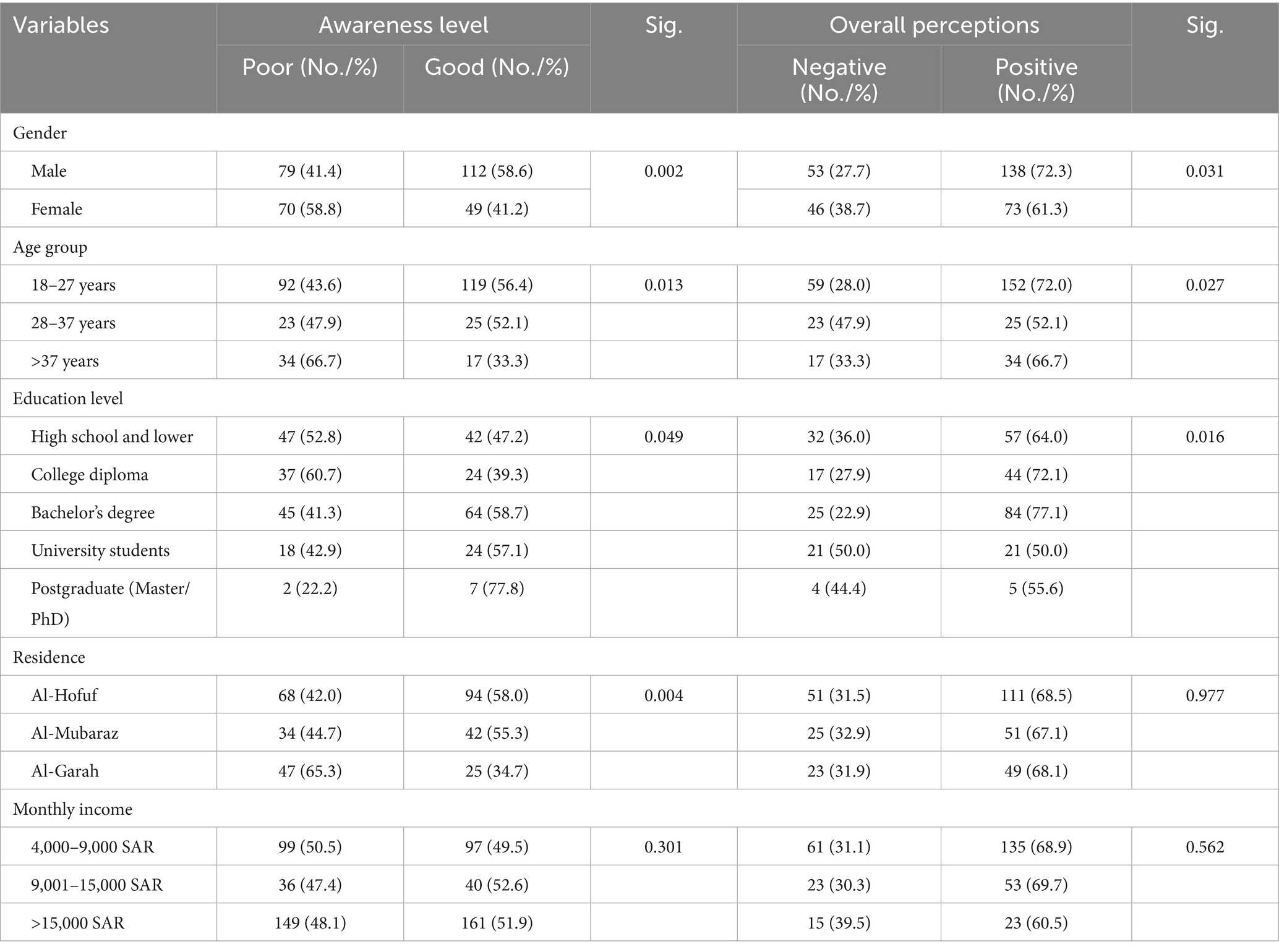
Table 3. Association between the participants’ socio-demographic variables, awareness level, and perceptions toward the impacts of advanced technology on the environment.
Regarding the study participants’ perceptions of the impacts of advanced technology on the environment. The results showed a significant association with gender, age group, and educational level (p < 0.05). However, males (72.3%), the younger population (72.0%), and the bachelor’s degree holders (77.1%) were associated with positive perceptions, whereas residence and average monthly income were not associated (p > 0.05).
3.5 Predictors of participants’ perceptions toward the impacts of advanced technology on the environment adjusted by awareness level
Multivariate analysis showed that some socio-demographic variables - age and education level - were significantly associated with study participants’ perceptions of the impacts of advanced technology on the environment (p < 0.05). Specifically, those aged (28–37) and (>37) years old were found to be less likely to have a positive perception [B = −1.18 and −0.23] respectively, than the younger study participants (18–27 years old). Even though all participants have different socio-demographic variables and they have good awareness levels, they were more likely to develop positive perceptions toward the impacts of advanced technology on the environment than those who have poor awareness levels (B = 1.65, OR = 5.20, 95% CI: 2.86–9.45). However, gender, residence, and average monthly income were not associated with the study participant’s perceptions of advanced technology’s negative impacts on the environment (p > 0.05). Thus, we can conclude that changing and developing perceptions is very complicated, as awareness alone is not enough, despite having a strong influence. However, people have other motivational factors that affect the complex interaction between awareness, demographic factors, and the development of perceptions (Table 4).
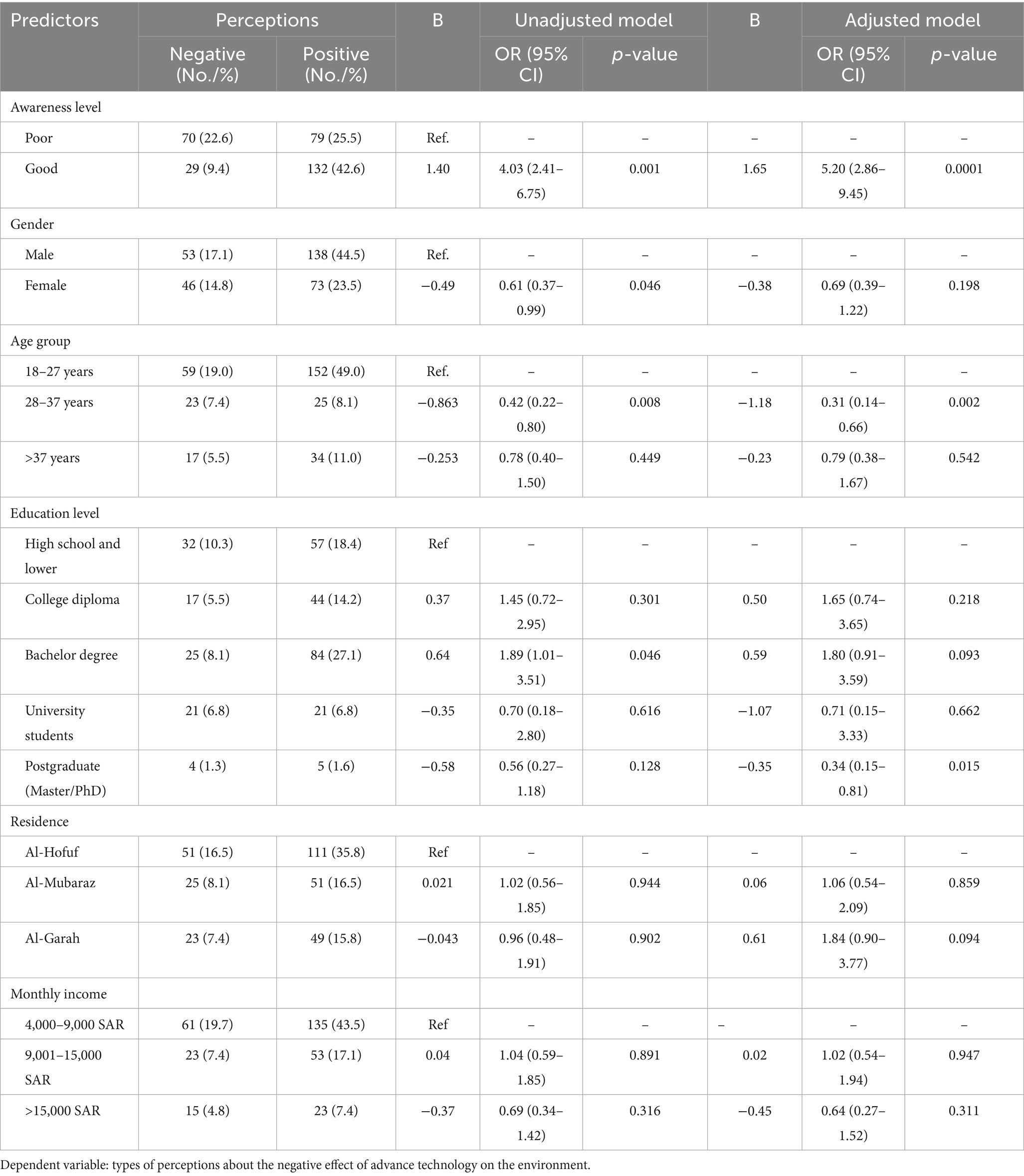
Table 4. Predictors of participants’ perceptions toward the impacts of advanced technology on the environment adjusted by awareness level.
3.6 Perceived behavior to reduce the negative impacts of advanced technology on the environment
Regarding the perceived behavior to reduce the negative impacts of advanced technology on the environment, Figure 2 shows that more than two-thirds of study participants use alternative technology in their daily activities. Moreover, 70.3% of study participants donated their equipment when they could not use it to reduce advanced technology’s negative impacts on the environment. These findings showed that the study participants believe in the positive outcomes associated with donating unused equipment and using alternative technology on the environment. Positive outcomes act as a significant stimulus for individuals to integrate environmental-friendly practices in their daily activities on various environmental issues. This indicates that assessing and understanding perceived behavior lead to promote healthier lifestyles, influence social norms and motivate community members to engage in sustainable behavior, which is reflected in practicing environmentally friendly behavior.
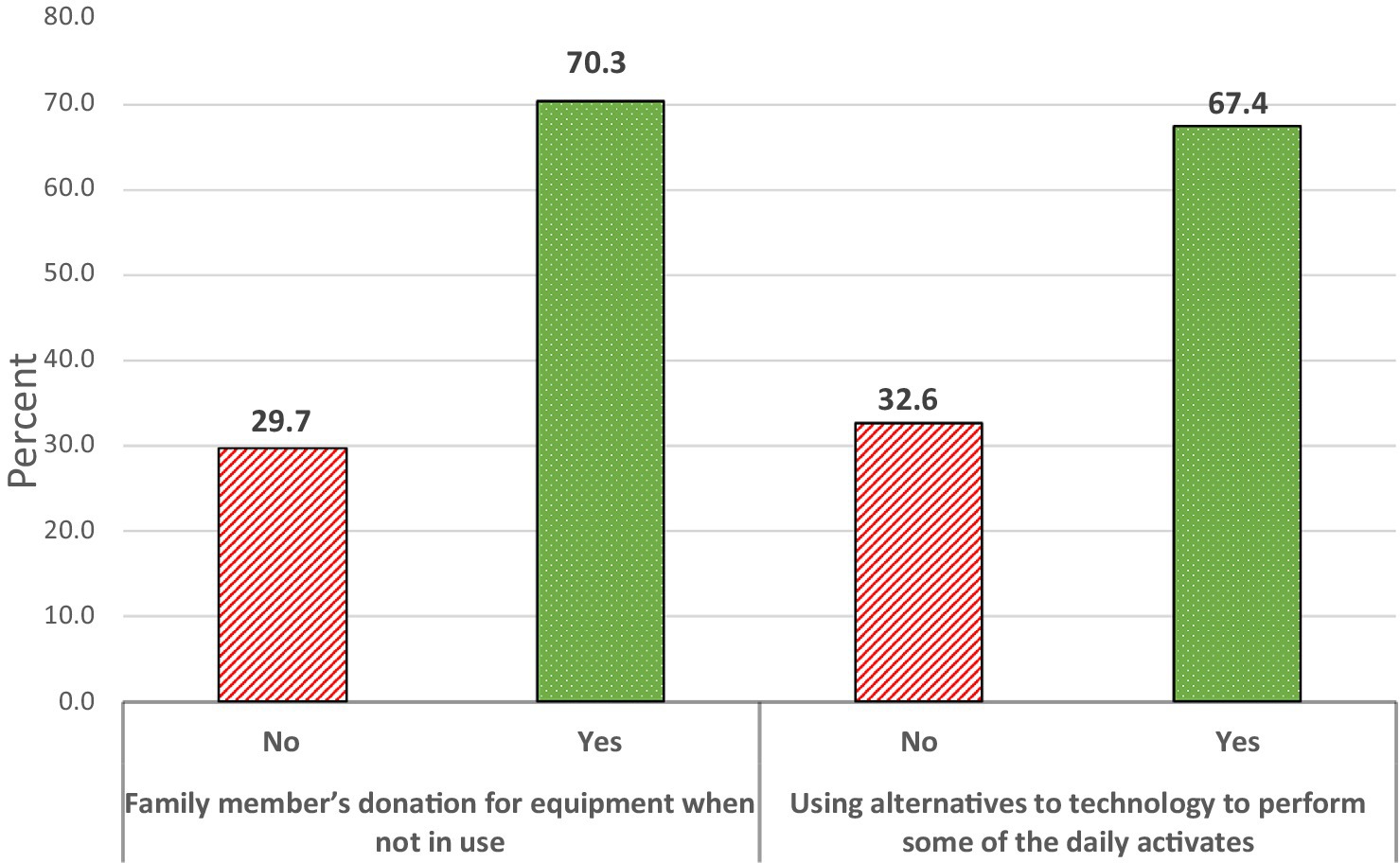
Figure 2. Perceived behavior to reduce the negative impacts of advanced technology on the environment.
3.7 Predictors on perceived behavior to reduce the negative impacts of advanced technology on the environment adjusted by socio-demographic variables
We observed that participants with positive perceptions, good awareness, and high monthly income were more likely to donate their equipment when not in use (β = 1.19, 0.79, 0.98), respectively. However, no significant differences in the odds of equipment donation were observed between other socio-demographic variables. It also showed that the odds of using alternatives to technology to reduce the negative impacts of advanced technology on the environment was (OR = 2.79, 1.81) times of using alternatives to technology among participants with positive perception and good awareness levels, respectively. In contrast, females were significantly less likely to use alternatives to technology (β = − 0.61). However, no significant differences in the odds of using alternatives to technology were observed between other socio-demographic variables (Table 5).
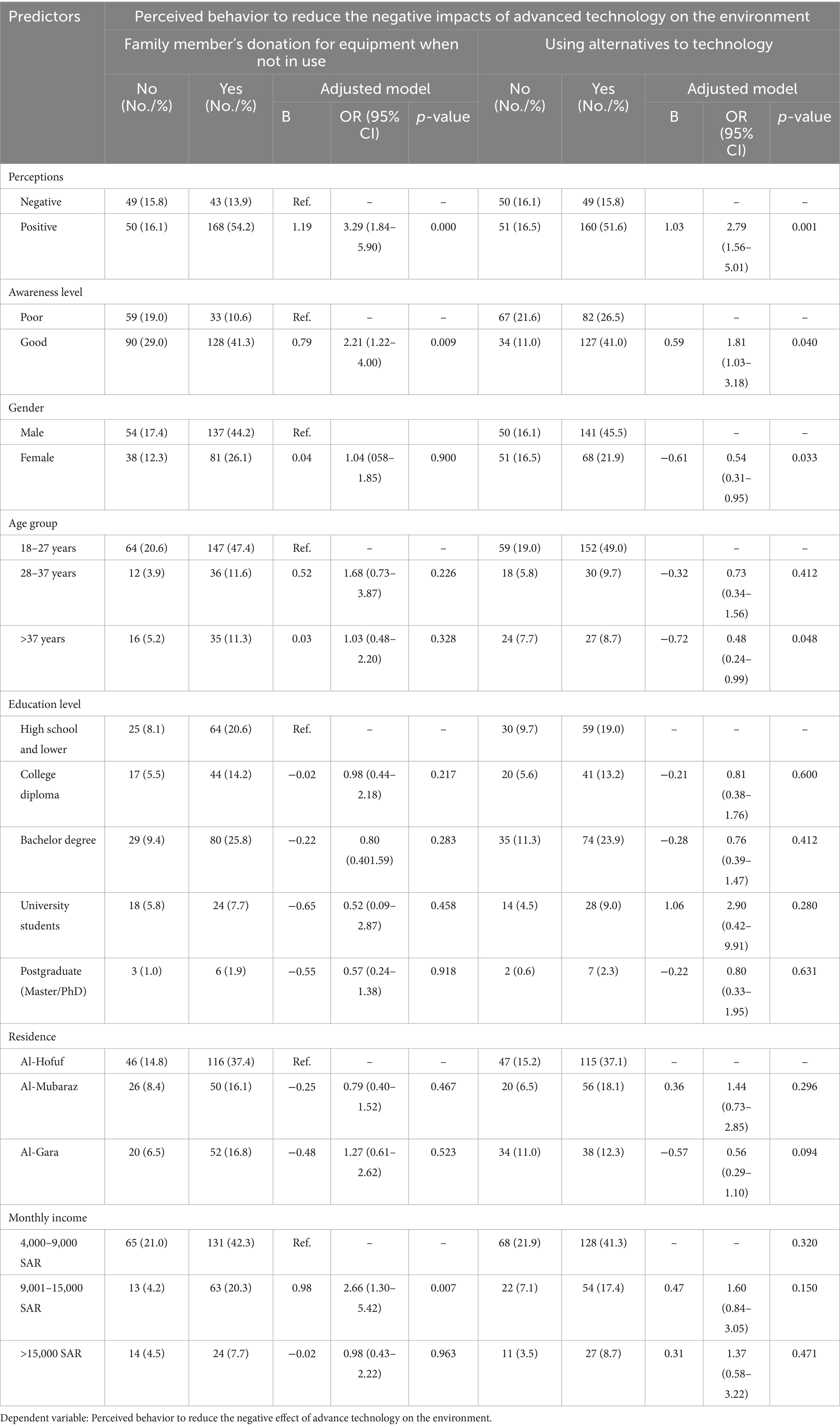
Table 5. Predictors on perceived behavior to reduce the negative impacts of advanced technology on the environment adjusted by socio-demographic variables.
4 Discussion
The United Nations announced that advanced technology utilization could create a complex web of unforeseen negative environmental consequences currently endangering many countries due to a lack of environmentally friendly awareness and irresponsible environmental behavior (20, 21). In Saudi Arabia, industrial growth, rapid urbanization, and a high-consumption lifestyle have led to the utilization of advanced technologies, which may create many environmental issues. In response to these issues, government policies recently focused on raising awareness and strengthening individual and collective feelings of responsibility for preserving and improving the environment. Previous studies confirmed that when people have environmental awareness, they gain an environmentally friendly perception that motivates them to responsible behaviors to care for the environment (22, 23). In this context, assessing people’s awareness, perception, and behavior is essential to create better environmental protection policies to reduce the adverse effects of advanced technology on the environment. The overall results of this study showed that more than half of the study participants exhibited a relatively good awareness level about the impacts of the advanced technology on the environment. This result is consistent with the findings of the study conducted in Bangladesh, revealing that the respondents had a moderate level of perceived knowledge about the causes of environmental pollution (23). Likewise, another study conducted in India among Higher Primary School Teachers showed that most of them had moderate levels of environmental awareness (24). The studies conducted in Oman (25), Malaysia (26), and Bangladesh (27) have reported that most respondents were aware of the environment. As with the respondents’ level of awareness, it was reported that the residents have unsatisfactory despite the government’s dedicated great efforts through environmental laws and regulations focusing on raising environmental awareness and strengthening individual and collective feelings of responsibility for preserving and improving the environment (28). These endeavors reflect that other motivational factors may influence the public’s level of environmental awareness.
Regarding the respondents’ perceptions of the impacts of advanced technology on the environment, our results indicated that two-thirds of study participants have a positive perception reflected in their agreement about the community and that recycling technology plays a crucial role in protecting the environment. These results were partially consistent with a study done in Puerto Rico which reported that government agencies and communities are responsible for responding to environmental risks related to the use of technology (29). In terms of recycling technology, a study in Malaysia showed that waste recycling technology significantly decreases ecological footprints (26). Despite these findings, people desire to use technology but must consider environmental considerations.
Our finding showed that some socio-demographic characteristics were significantly associated with the respondents’ awareness level of the adverse impacts of advanced technology on the environment. Specifically, males, younger respondents, those with bachelor’s degrees, and urban residents have a high level of awareness. These findings are consistent with the studies conducted in developing countries such as China (30) and Malaysia (31). Concerning the association between gender and environmental awareness, many studies that have explored this association remain controversial. For example, studies conducted in Oman, India, and Malaysia have shown that females have significantly higher levels of environmental awareness than their male counterparts (24, 25, 31). In contrast, a study conducted in Bangladesh reported that both males and females were shown to have lower levels of environmental awareness (3). However another study conducted among secondary school students stated that males were more knowable than females about environmental issues (32).
Concerning the respondents’ perceptions of the impacts of advanced technology on the environment, our results showed that being male, younger, and bachelor’s degree holders were significantly associated with positive perceptions toward the use of technologies that are environment-friendly. These findings are consistent with studies conducted in developing countries such as Turkey (33), Bangladesh (3), Kenya (34), and Malaysia (31). Many studies have explored the association between socio-demographic characteristics and perceptions, and this association remains controversial. For instance, some studies reported that having a higher education degree is associated with poor perceptions (34, 35). In contrast, other studies indicate that a low education level significantly determines annoyance with perceived air pollution levels (36). Despite the controversial association of demographic variables with awareness and perceptions of the adverse effects of technology on the environment, they remain essential in environmental research because they represent underlying aspects that affect susceptibility and exposure to environmental factors. Therefore, there is a need for careful selection and interpretation of social indicators depending on their relevance to the problem under study.
Multivariate analysis showed that younger individuals with high education degrees adjusted with a good level of awareness were more likely to develop positive perceptions toward the impacts of advanced technology on the environment. Thus, developing and changing perceptions is complicated, as more than awareness is required. Despite having a significant influence, people may have other motivational factors that affect the complex interaction between awareness, demographic factors, and the development or changing of perceptions.
Regarding the perceived behavior to reduce the adverse impacts of advanced technology on the environment. Our finding shows that more than two-thirds of study participants use alternative technology in their daily activities and donate their equipment when not in use. Regarding alternative technology in literature, it has been explained to ensure a secure supply of environmentally friendly technology that avoids potential future materials crises (37–40). On the other hand, the literature also explains equipment donation as an activity that conserves natural resources and avoids air and water pollution caused by manufacturing virgin materials (36, 41, 42). Based on the previous discussion, our community knows these activities benefit in reducing adverse environmental consequences. Thus, there is a need for a promotion program to prepare them to practice these environmentally friendly and other activities continually.
Concerning the predictors on perceived behavior to reduce the negative impacts of advanced technology on the environment adjusted by socio-demographic variables. It can be noted that the participants who had positive perceptions and good awareness were more likely to donate their equipment when not in use and using alternatives to technology. Several studies have explored the value of perception and awareness in shaping individual behavior (22, 26, 43–45). It emphasized that when individuals possess the awareness and positive perceptions, these motivate them to practice responsible behavior toward the environment, such as donating their equipment when not in use, using alternatives to technology, and other activities with significant environmental effects. These findings reveal the value of awareness programs among the community to build environmental concern and encourage positive perceptions to shape their practices toward the environment. This suggestion supports (46), who reported that environmental education is the foundation for creating an environmentally conscious society and a more ethical community (45). The main limitation of this study is that data was gathered from the study participants using a survey and self-reported data; therefore, we cannot avoid the possibility of information bias, and a cross-sectional study cannot establish cause-and-effect relationships. Moreover, a lower response rate was obtained from the Al-Mubaraz area. However, these limitations may affect the generalizability of the study results.
5 Conclusion
In conclusion, this study has given supportive evidence to stockholders and academics regarding the association between and among the community’s awareness, perceptions, and behaviors regarding the undesirable effects of advanced technology on the environment. We found that more than half of the study participants exhibited a relatively good awareness level and a positive perception, especially males, younger respondents, those with bachelor’s degrees, and urban residents. Multivariate analysis showed that younger respondents with high education levels adjusted with good levels of awareness were more likely to develop positive perceptions toward the negative impacts of advanced technology on the environment. In addition, we observed that the participants with positive perceptions and good awareness were more likely to donate their equipment when not in use and use alternatives to technology. Awareness and positive perceptions motivate them to practice responsible behaviors toward the environment. In this regard, there is a need for education and promotion programs to be implemented in the community to promote concern for the environment, encourage favorable perceptions to shape their practices and prepare them to practice these environmentally friendly and other desirable activities continuously. In addition, researchers should carefully select and interpret social indicators depending on their relevance to the problem under study.
Data availability statement
The raw data supporting the conclusions of this article will be made available by the authors, without undue reservation.
Ethics statement
The studies involving humans were approved by Research Ethics Committee at King Faisal University with reference number KFU-REC-2023-DEC-ETHICS1704. The studies were conducted in accordance with the local legislation and institutional requirements. The participants provided their written informed consent to participate in this study.
Author contributions
YE: Formal analysis, Writing – original draft, Methodology, Conceptualization. AA: Investigation, Writing – review & editing, Data curation, Validation, Resources. ML: Writing – review & editing, Investigation. SB: Software, Writing – review & editing. BH: Writing – review & editing. MAa: Investigation, Writing – review & editing. AI: Writing – review & editing. MAl: Writing – review & editing. HAl: Writing – review & editing. AE: Writing – review & editing, Investigation. EF: Writing – review & editing. HAr: Investigation, Writing – review & editing. EC: Validation, Writing-review & editing. EA: Resources,Writing-review & editing. SA: Software, Writing – review & editing, Supervision. AA-H: Supervision, Software, Writing – review & editing. AA-M: Resources, Supervision, Writing – review & editing, Software. GA: Writing – review & editing, Formal analysis, Resources, Methodology, Investigation.
Funding
The author(s) declare that financial support was received for the research and/or publication of this article. This work was supported by the Deanship of Scientific Research, Vice Presidency for Graduate Studies and Scientific Research, King Faisal University, Saudi Arabia [Grant No. KFU252962].
Acknowledgments
We are profoundly thankful to all participants for providing their time in filling the research questionnaire. Moreover, the authors acknowledge the following students Elias Al-Abbad, Aassef Al-Bahrani, Abdulhadi Al-Abbad, Nasser Al-khamis, Mustafa Al-Abdullah, for their cooperation in terms of distributing the questionnaire’s link among their fellows and data collection. On the other hand, the authors acknowledge the Deanship of Scientific Research at King Faisal University, Al-Ahsa for their financial support under the [Grant No. KFU252962]. Lastly, we acknowledge the administrative staff of the College of Applied Medical Science for the support and approval that led to the smooth implementation of the research.
Conflict of interest
The authors declare that the research was conducted in the absence of any commercial or financial relationships that could be construed as a potential conflict of interest.
Generative AI statement
The authors declare that no Gen AI was used in the creation of this manuscript.
Any alternative text (alt text) provided alongside figures in this article has been generated by Frontiers with the support of artificial intelligence and reasonable efforts have been made to ensure accuracy, including review by the authors wherever possible. If you identify any issues, please contact us.
Publisher’s note
All claims expressed in this article are solely those of the authors and do not necessarily represent those of their affiliated organizations, or those of the publisher, the editors and the reviewers. Any product that may be evaluated in this article, or claim that may be made by its manufacturer, is not guaranteed or endorsed by the publisher.
References
1. Ausubel, JH. Regularities in technological development: an environmental view. Technol Environment. (1989) 25:70–91.
2. Ausubel, J, and Sladovich, HE. Technology and environment. Washington, DC: National Academy Press (1989).
3. Nahar, S. Improving students' collaboration thinking skill under the implementation of the quantum teaching model. Int J Instr. (2022) 15:451–64. doi: 10.29333/iji.2022.15325a
4. Okafor, CC, Nzekwe, CA, Nduji, NN, Ajaero, CC, and Ibekwe, JC. Energy and material recovery potential from municipal solid wastes (MSW) in Nigeria: challenges and opportunities. Clean Technol Recycling. (2022) 2:282–307. doi: 10.3934/ctr.2022015
5. Luan, F, Yang, X, Chen, Y, and Regis, PJ. Industrial robots and air environment: a moderated mediation model of population density and energy consumption. Sustain Prod Consum. (2022) 30:870–88. doi: 10.1016/j.spc.2022.01.015
6. Jaffe, AB, Newell, RG, and Stavins, RN. A tale of two market failures: technology and environmental policy. Ecol Econ. (2005) 54:164–74. doi: 10.1016/j.ecolecon.2004.12.027
7. Cavalett, O, Chagas, MF, Junqueira, TL, Watanabe, MD, and Bonomi, A. Environmental impacts of technology learning curve for cellulosic ethanol in Brazil. Ind Crop Prod. (2017) 106:31–9. doi: 10.1016/j.indcrop.2016.11.025
8. Wolff, WJ, Dankers, N, Dijkema, KS, Reijnders, PJH, and Smit, CJ. Biodiversity of the Wadden Sea (Denmark, Germany, The Netherlands): recent changes and future projections. In: Biodiversity, Temperate Ecosystems, and Global Change. NATO ASI Series, vol 20. Boyle TJB and Boyle CEB. (eds) Berlin, Heidelberg: Springer. (1994). doi: 10.1007/978-3-642-78972-4_18
9. Negative Impact of Technology on the Environment. TRVST, (2021), Available online at:www.trvst.world/environment/negative-impact-of-technology-on-the-environment/.
10. USA. Environmental Protection Agency. Inventory of US greenhouse gas emissions and sinks. Washington, D.C.: 1990–2017 EPA (2017).
11. Palmer, PI, O'Doherty, S, Allen, G, Bower, K, Bösch, H, Chipperfield, MP, et al. A measurement-based verification framework for UK greenhouse gas emissions: an overview of the greenhouse gAs UK and global emissions (GAUGE) project. Atmos Chem Phys. (2018) 18:11753–77. doi: 10.5194/acp-18-11753-2018
12. Eren, H. Wiley encyclopedia of electrical and electronics engineering. In Environmental impacts of technology, J. G. Webster Ed. (1999). 1–33. doi: 10.1002/047134608X.W7303
13. Cassia, R, Nocioni, M, Correa-Aragunde, N, and Lamattina, L. Climate change and the impact of greenhouse gasses: CO2 and NO, friends and foes of plant oxidative stress. Front Plant Sci. (2018) 9:273. doi: 10.3389/fpls.2018.00273
14. Smith, TW, Kim, J, and Son, J. Public attitudes toward climate change and other environmental issues across countries. Int J Sociol. (2017) 47:62–80. doi: 10.1080/00207659.2017.1264837
15. Chu, EW, and Karr, JR. Environmental impact: Concept, consequences, measurement. Reference module in life sciences. In Reference Module in Life Sciences, Elsevier (2017). doi: 10.1016/B978-0-12-809633-8.02380-3
16. Voulvoulis, N, and Burgman, MA. The contrasting roles of science and technology in environmental challenges. Crit Rev Environ Sci Technol. (2019) 49:1079–106. doi: 10.1080/10643389.2019.1565519
17. World Economic Forum (2017) The global risks report 2017, 12th edition Available online at:http://www3.weforum.org/docs/GRR17_Report_web.pdf
18. Herbert, KG, Hill, E, Fails, JA, Ajala, JO, Boniface, RT, and Cushman, PW. Scientific data infrastructure for sustainability science mobile applications. In 2014 IEEE International Congress on Big Data (2014)(pp. 804–805). IEEE.
19. Al-Ahsa, Saudi Arabia - Population and Demographics. Available online at:https://www.city-facts.com/al-ahsa/population
20. Meinhold, JL, and Malkus, AJ. Adolescent environmental behaviors: can knowledge, attitudes, and self-efficacy make a difference? Environ Behav. (2005) 37:511–32. doi: 10.1177/0013916504269665
21. United Nations (2018) World economic and social survey 2018 – Frontier technologies for sustainable development Available online at:https://www.un.org/development/desa/dpad/wp-content/uploads/sites/45/publication/WESS2018_full_web.pdf
22. Hungerford, HR, and Volk, TL. Changing learner behavior through environmental education. J Environ Educ. (1990) 21:8–21. doi: 10.1080/00958964.1990.10753743
23. Nahar, N, Hossain, Z, and Mahiuddin, S. Assessment of the environmental perceptions, attitudes, and awareness of city dwellers regarding sustainable urban environmental management: a case study of Dhaka, Bangladesh. Environ Dev Sustain. (2023) 25:7503–31. doi: 10.1007/s10668-022-02354-y
24. Larijani, M. Assessment of environmental awareness among higher primary school teachers. J Hum Ecol. (2010) 31:121–4. doi: 10.1080/09709274.2010.11906302
25. Al-Shidi, HK, Ambusaidi, AK, and Sulaiman, H. Public awareness, perceptions and attitudes on air pollution and its health effects in Muscat, Oman. J Air Waste Manage Assoc. (2021) 71:1159–74. doi: 10.1080/10962247.2021.1930287
26. Abdul-Halim, NS, Ruslan, NS, Idris, NS, and Nawawi, SA. Knowledge, attitude and practice of environmental sustainability among sustainable science students in Universiti Malaysia Kelantan. IOP Conf Ser Earth Environ Sci. (2021) 842:012048. doi: 10.1088/1755-1315/842/1/012048
27. Rahman, S. Environmental impacts of modern agricultural technology diffusion in Bangladesh: an analysis of farmers' perceptions and their determinants. J Environ Manag. (2003) 68:183–91. doi: 10.1016/S0301-4797(03)00066-5
28. Dasgupta, S, Mody, A, Roy, S, and Wheeler, D. Environmental regulation and development: a cross-country empirical analysis. Oxf Dev Stud. (2001) 29:173–87. doi: 10.1080/13600810125568
29. Perez-Ramos, JG, McIntosh, S, Barrett, ES, Velez Vega, CM, and Dye, TD. Attitudes toward the environment and use of information and communication technologies to address environmental health risks in marginalized communities: prospective cohort study. J Med Internet Res. (2021) 23:e24671. doi: 10.2196/24671
30. Liu, X, Wu, Y, Hu, Y, Liu, D, Zhang, J, Chen, C, et al. Government employees’ perception of urban air pollution and willingness to pay for improved quality: a cross-sectional survey study in Nanchang, China. Environ Sci Pollut Res. (2016) 23:22183–9. doi: 10.1007/s11356-016-7204-1
31. Chin, YS, De Pretto, L, Thuppil, V, and Ashfold, MJ. Public awareness and support for environmental protection—a focus on air pollution in peninsular Malaysia. PLoS One. (2019) 14:e0212206. doi: 10.1371/journal.pone.0212206
32. Polat, MB, Karaçizmeli, İH, Atasoy, AD, and Yeşilnacar, Mİ. Assessment of the knowledge, emotions and behaviours of secondary school students towards the environment and recycling in southeastern Turkey. Eur J Educ. (2024) 59:e12676.
33. Saricam, SY, Kara, B, and Nurlu, E. Environmental attitude of young and adult individuals: the sample of Izmir. J Food Agric Environ. (2011) 9:658–65. doi: 10.1088/1755-1315/842/1/012048
34. Egondi, T, Kyobutungi, C, Ng, N, Muindi, K, Oti, S, Van de Vijver, S, et al. Community perceptions of air pollution and related health risks in Nairobi slums. Int J Environ Res Public Health. (2013) 10:4851–68. doi: 10.3390/ijerph10104851
35. Kim, M, Yi, O, and Kim, H. The role of differences in individual and community attributes in perceived air quality. Sci Total Environ. (2012) 425:20–6. doi: 10.1016/j.scitotenv.2012.03.016
36. Semenza, JC, Wilson, DJ, Parra, J, Bontempo, BD, Hart, M, Sailor, DJ, et al. Public perception and behavior change in relationship to hot weather and air pollution. Environ Res. (2008) 107:401–11. doi: 10.1016/j.envres.2008.03.005
37. United States Environmental Protection Agency. Frequent Questions on Recycling Accessed: June 8, 2024: Available online at:https://www.epa.gov/recycle/frequent-questions-recycling
38. Massachusetts Institute of Technology. Alternative technology. Accessed: April 25, 2024: web.mit.edu.
39. Mohammed, SI. Advantages of green technology to mitigate the environment problems. IOP Conf Ser Earth Environ Sci. (2021) 779:012133. doi: 10.1088/1755-1315/779/1/012133
40. GhaffarianHoseini, A, Tookey, J, GhaffarianHoseini, A, Naismith, N, and Bamidele Rotimi, JO. Integrating alternative technologies to improve built environment sustainability in Africa: nexus of energy and water. Smart Sustain Built Environ. (2016) 5:193–211. doi: 10.1108/SASBE-07-2015-0015
41. Almulhim, AI. Household's awareness and participation in sustainable electronic waste management practices in Saudi Arabia. Ain Shams Eng J. (2022) 13:101729. doi: 10.1016/j.asej.2022.101729
42. Dwivedy, M, and Mittal, RK. Willingness of residents to participate in e-waste recycling in India. Environ Develop. (2013) 6:48–68. doi: 10.1016/j.envdev.2013.03.001
43. Al-Khalidi, GZ, and Nasir, NA. Knowledge, attitude, and practice regarding needle stick injuries among health care workers in Baghdad teaching hospital and Ghazy Al-Hariri Hospital for Surgical Specialties in 2020. Open Access Maced J Med Sci. (2022) 10:1–7. doi: 10.3889/oamjms.2022.9963
44. Liao, X, Nguyen, TP, and Sasaki, N. Use of the knowledge, attitude, and practice (KAP) model to examine sustainable agriculture in Thailand. Reg Sustain. (2022) 3:41–52. doi: 10.1016/j.regsus.2022.03.005
45. Hassan, A, Rahman, NA, and Abdullah, SI. The level of environmental knowledge, awareness, attitudes and practices among UKM students. University Kebangsaan, Malaysia. (2011) 13:5–8.
Keywords: community awareness, behaviors, technology, environment, KSA
Citation: Elmosaad YM, Al Rajeh AM, Llaguno MBB, Belal S, Hassan BH, Aatif M, Ibrahim A, Almulhem M, Albugami HF, Elhassan AMS, Fabella EL, Arakeep HM, Cancino EC, Estrella ED, Almaani S, Al hashem AS, Al Moweshy AA and Al Jowf GI (2025) Community awareness, perception, and perceived behaviors regarding the impacts of advanced technology on the environment among residents of the eastern region, Saudi Arabia: a cross-sectional study. Front. Public Health. 13:1649249. doi: 10.3389/fpubh.2025.1649249
Edited by:
Lena Hatchett, Loyola University Chicago, United StatesReviewed by:
Magdalena Klimczuk-Kochańska, University of Warsaw, Polandİzzettin Hakan Karaçizmeli, Harran University, Türkiye
Copyright © 2025 Elmosaad, Al Rajeh, Llaguno, Belal, Hassan, Aatif, Ibrahim, Almulhem, Albugami, Elhassan, Fabella, Arakeep, Cancino, Estrella, Almaani, Al hashem, Al Moweshy and Al Jowf. This is an open-access article distributed under the terms of the Creative Commons Attribution License (CC BY). The use, distribution or reproduction in other forums is permitted, provided the original author(s) and the copyright owner(s) are credited and that the original publication in this journal is cited, in accordance with accepted academic practice. No use, distribution or reproduction is permitted which does not comply with these terms.
*Correspondence: Ghazi I. Al Jowf, Z2Fsam93ZkBrZnUuZWR1LnNh; Yousif M. Elmosaad, eWVsbW9zYWFkQGtmdS5lZHUuc2E=
 Yousif M. Elmosaad
Yousif M. Elmosaad Ahmed M. Al Rajeh2
Ahmed M. Al Rajeh2 Bothaina H. Hassan
Bothaina H. Hassan Mohammad Aatif
Mohammad Aatif Munerah Almulhem
Munerah Almulhem Eduardo L. Fabella
Eduardo L. Fabella